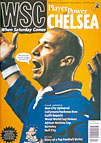 Mark Foreman discusses the sheer quantity of football books that are ready to hit the shelves
Mark Foreman discusses the sheer quantity of football books that are ready to hit the shelves
It was only when I was told that bookshops are expecting over 30 new titles to appear on the shelves in time for the World Cup that the full scale of the football publishing boom hit home. These days it would seem that no player, club or fan’s eye view is too ‘marginal’ (a phrase all too common to anyone with a shoe box full of rejection letters) for big name publishers to print.
The enormous sales achieved by Fever Pitch had commissioning editors throughout the book world drooling over the prospect of a brand new market. The results of the publishers’ stampede into the under-exploited world of football writing have been an equal mix of the innovative, the banal, and the sort of glossy, overpriced crap we’re coming to expect from an industry overdosing on money.
The innovative we all know about. The opportunity to buy properly-researched and well-written football books by people who actually know and care about the game has been one of the great benefits of football’s elevation into the sphere of ‘culture’. The banal continues to spew off the presses as publishers use football as a peg on which to hang any old rubbish that can’t be sold any other way. To wit, a rash of painful ‘joke’ books such as The World’s Best Football Jokes published by HarperCollins at £2.99 (‘Punter: “£50 on Liverpool to beat Dundee.” Bookie: “We don’t take bets on friendlies.” Punter: “Don’t be daft, Liverpool don’t play friendlies!”), books touting dodgy betting systems and some tacky children’s books (Baby Jumbo Bath Books: Harry’s Football Fun. Grandreams £3.99). Football can even help you learn a language according to Bouboul au Football (Cherrytree £6.99). How much longer before Crystal Healing and the Inner Child – Soccer and Spiritual Growth?
Back in the mainstream, the publishing world has a familiar feel to it. At the bottom of the pyramid, labours of love by Hereford or Dunfermline fans interest small, dedicated cliques of paying customers. At the top, a premier league for a select few big name authors, awash with money, exclusive deals and agents, selling in huge quantities to a mass market. The sums being advanced to football’s blockbusting authors are going through the roof – Ruud Gullit’s agents Peters Fraser & Dunlop negotiated a “mid-five-figure” advance for his diary of the 1996-97 season.
This though has been dwarfed by Kevin Keegan’s three-book £500,000 deal. That puts Keegan in the same league as literary giants such as the Spice Girls, Terry Pratchett, Mrs Merton and David Mellor (unbelievably paid £185,000 by Michael Joseph Publishers for his memoirs), and was the fifth biggest publishing deal of any kind in 1997. I don’t want to know what Gareth Southgate got up front from Boxtree when they signed him up to write a World Cup diary. Particularly when his PR describes him as the man “who won a place in the hearts of the nation when he missed the crucial penalty…”. The lovable silly-billy.
At least with big-money deals for individuals you know where you stand – you’re interested in the author or you’re not. But there is something pernicious about the growing trend for one-club exclusive deals. Commercial kings Manchester United were, of course, the first club to spot the potential of such arrangements. They signed up with Andre Deutsch, who can now plaster any book with United’s logo. The psychological and financial pressure on cash-strapped fans, particularly parents of young fans, brought on by yet another batch of ‘official’ products purposely designed to be quickly out of date, is immense. The trade promo blurb for David Beckham’s autobiography gleefully announces that the book will be reprinted with new chapters after the World Cup – before the first edition is even out. The potential for this self-renewing and never-ending line of business (death and relegation permitting) is obvious.
Where United lead, others can’t wait to follow. Chelsea, for example, have recently signed a similar exclusive deal with Boxtree. Boxtree managing director Adrian Sington puts the publisher’s point of view succinctly: “If you do an expensive, large-format hardback and don’t get it authorised, you’re crazy. But I don’t believe that official books get you any greater exposure.” Exposure, though, is not the point. The increasing worry for publishers is the complex financial web spun around the books’ subjects. A publisher can find itself negotiating with the club, its sponsors, the player’s agent, the FA, the England team and its sponsors, boot manufacturers, TV companies… and then there’s the picture research. Are the players wearing the right kit ? Is the logo presented clearly? Has copyright permission been obtained to show the sponsored trophy? Given these headaches would anyone even consider an authorised book on, say, Nike-sponsored, Umbro-wearing Ronaldo? Maybe, but it would be a close call.
The revolution in football book publishing has been fan-driven and is all the better for it. But for every project like The Far Corner there now five, ten, maybe even 100 in the class of – Legs Eleven: Zoe Ball’s Football Dream Team – The Beautiful Game’s Most Beautiful Boys. Such is big business. But football is now so overwhelmed with competing interests that making money on its spin-offs is becoming ever more difficult. If in another two or three years the Premier/European league edifice begins to wobble, the publishing boom will subside and that 1976 Tiger & Scorcher annual will once again become hot property. Personally I can’t wait.
From WSC 134 April 1998. What was happening this month